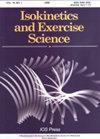Quadriceps activation during maximal isometric and isokinetic contractions: The minimal real difference and its implications
IF 0.7
4区 医学
Q4 ENGINEERING, BIOMEDICAL
引用次数: 1
Abstract
BACKGROUND: A method of measurement of voluntary activation (VA, percent of full muscle recruitment) during isometric and isokinetic concentric contractions of the quadriceps femoris (QF) at 60∘/s and 120∘/s was previously validated. OBJECTIVE: This study aimed to quantify the test-retest minimal real difference (MRD) of VA during isometric (ISOM) and isokinetic concentric contractions of QF (100∘/s, ISOK) in a sample of healthy individuals. METHODS: VA was measured through the interpolated twitch technique. Pairs of electrical stimuli were delivered to the QF at 40∘ of knee flexion during maximal voluntary contractions. Twenty-five healthy participants (20–38 years, 12 women, 13 men) completed two testing sessions with a 14-day interval. VA values were linearized through logit transformation (VAl). The MRD was estimated from intraclass correlation coefficients (model 2.1). RESULTS: The VA (median, range) was 84.20% (38.2–99.9%) in ISOM and 94.22% (33.8–100%) in ISOK. MRD was 0.78 and 1.12 logit for ISOM and ISOK, respectively. As an example, in terms of percent VA these values correspond to a change from 76% to 95% and from 79% to 98% in ISOM and in ISOK, respectively. CONCLUSIONS: The provided MRD values allow to detect significant individual changes in VA, as expected after training and rehabilitation programs.最大等长和等速收缩时的股四头肌激活:最小实际差异及其意义
背景:一种测量股四头肌(QF)在60∘/s和120 \8728/s的等长和等速同心收缩过程中自主激活(VA,完全肌肉募集的百分比)的方法先前已得到验证。目的:本研究旨在量化健康个体样本中QF(100∘/s,ISOK)等长(ISOM)和等速同心收缩期间VA的重测最小实差(MRD)。方法:采用内插抽动技术测量VA。在最大自主收缩期间,在膝关节屈曲40°时向QF提供成对的电刺激。25名健康参与者(20-30岁,12名女性,13名男性)完成了两次测试,间隔14天。VA值通过logit变换(VAl)线性化。MRD由组内相关系数估计(模型2.1)。结果:在ISOM中,VA(中位数,范围)为84.20%(38.2–99.9%),在ISOK中为94.22%(33.8–100%)。ISOM和ISOK的MRD分别为0.78和1.12 logit。例如,就VA百分比而言,这些值分别对应于ISOM和ISOK中从76%到95%和从79%到98%的变化。结论:所提供的MRD值可以检测VA的显著个体变化,正如训练和康复计划后所预期的那样。
本文章由计算机程序翻译,如有差异,请以英文原文为准。
求助全文
约1分钟内获得全文
求助全文
来源期刊

Isokinetics and Exercise Science
医学-工程:生物医学
CiteScore
1.20
自引率
14.30%
发文量
37
审稿时长
>12 weeks
期刊介绍:
Isokinetics and Exercise Science (IES) is an international journal devoted to the study of theoretical and applied aspects of human muscle performance. Since isokinetic dynamometry constitutes the major tool in this area, the journal takes a particular interest in exploring the considerable potential of this technology.
IES publishes studies associated with the methodology of muscle performance especially with respect to the issues of reproducibility and validity of testing, description of normal and pathological mechanical parameters which are derivable from muscle testing, applications in basic research topics such as motor learning paradigms and electromyography. The journal also publishes studies on applications in clinical settings and technical aspects of the various measurement systems employed in human muscle performance research.
The journal welcomes submissions in the form of research papers, reviews, case studies and technical reports from professionals in the fields of sports medicine, orthopaedic and neurological rehabilitation and exercise physiology.
 求助内容:
求助内容: 应助结果提醒方式:
应助结果提醒方式:


